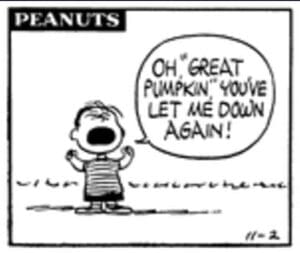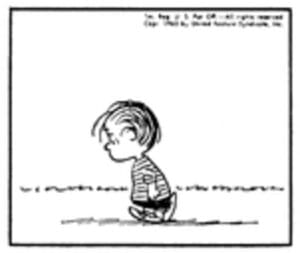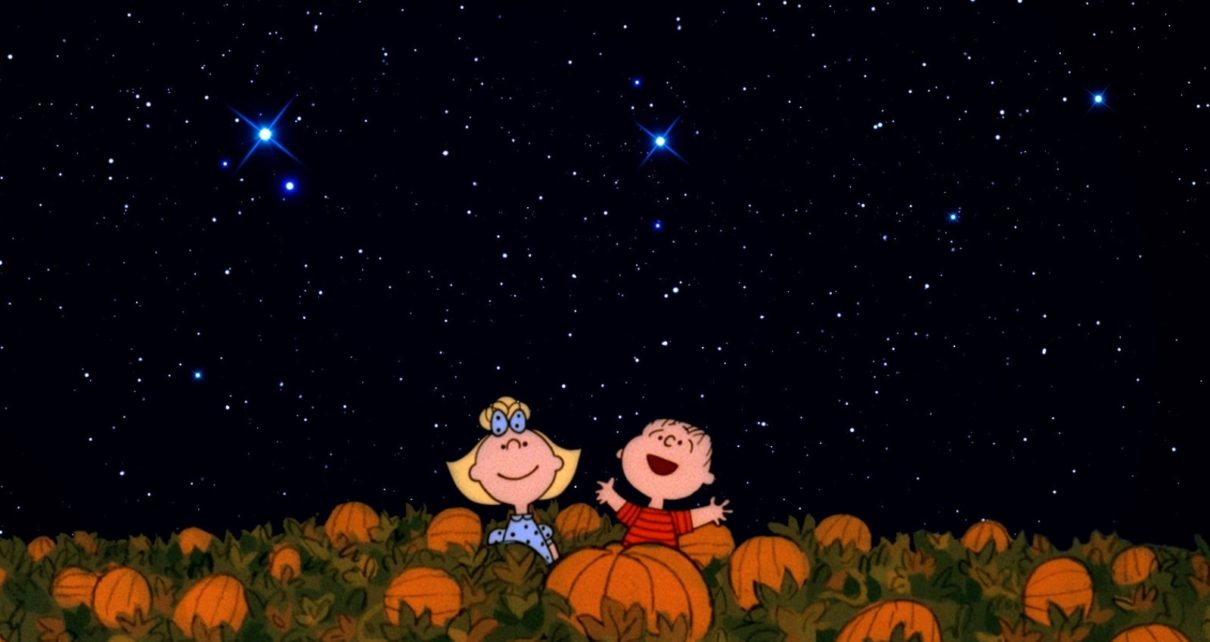In October 1959, Charles M. Schultz introduced a character into his Peanuts comic strip that would become an integral part of American pop culture even though he only ever appeared in a couple of title frames: the Great Pumpkin. In fact, the whole comedic schtick centers on Linus’ complete devotion to waiting in a pumpkin patch every Halloween night to see the Great Pumpkin as he flies through the air with his bag of toys, despite never successfully experiencing that. In the face of ridicule from the rest of the Peanuts gang, Linus never wavers in his conviction that not only does the Great Pumpkin exist but also that he will one day find a pumpkin patch sincere enough to warrant the Great Pumpkin’s appearance. No matter what objections are raised by his naysayers, he boldly proclaims his confidence in his Halloween hero — that is, until that night arrives but the Great Pumpkin doesn’t. All of a sudden, he starts to wonder if his faith has been misplaced, and cries out in frustration at the repeated disappointment, only to promptly realize his folly and reaffirm his belief.




Every year Linus does the same dance with the Great Pumpkin. All year long, he’s confident; then the moment of truth arrives, things don’t go the way he hoped they would — the way he told everyone they would — and he becomes frustrated, disappointed, and angry. Then, he either comes to his senses, or someone else ridicules him for his belief, and his bravado returns. We laugh at his dedication to such a ridiculous fairy tale, and at how quickly his conviction turns to doubt and back again. It’s a nervous laughter, however, because, if we’re honest, we identify with it. I know I do, at least.
Now, I’m not suggesting that Schultz was trying to make any grandiose spiritual statements with Linus’ fixation, and I am certainly not comparing the God of the universe to a fictional flying gourd. What makes me nervous, however, is how accurately the fickleness of Linus’ faith mirrors my own. When things are fine and dandy, it’s easy to proclaim my faith boldly, but in those moments when my faith is being directly tested, the threshold of pressure that’s required to make me start changing my story is embarrassingly low.
I cannot begin to describe how incredibly disconcerting and shamefully humiliating it is to struggle with worry and doubt the goodness of God, when I, quite literally, wrote the book on hope and waiting. And yet, the truth is that I do. Perhaps not as much or as frequently as I used to, but still enough to call the veracity of what I proclaim and the integrity of what I believe into question.
I had such a moment just last week. I awoke that morning with dread hanging over my head before my feet even hit the floor. I was scheduled to talk to a podcaster later that day about appearing on their show to promote my book, so my panic attack could not have been more poorly timed. Ironically, bad timing was actually the force driving my anxiety. As you know, my wife has stage 4 cancer, so health insurance is a big deal for us. Last month I received notice that my COBRA coverage from being laid off a year and a half ago would terminate at the end of this month. Confident that God would provide, I concluded that He would certainly provide me with a job with benefits before this month’s end, and was encouraged that He was doing just that when a recruiter from a company I had contacted months ago called. The job they wanted to discuss seemed to be a perfect fit, and I had a very promising conversation with the hiring manager. If hired, I would start the job right before our insurance would lapse. True to His character, God was showing up right on time, just like I knew He would.
However, on that fateful morning, two weeks had passed and I had heard nothing more from that company. Emails sent directly to both the recruiter and the hiring manager asking for an update had gone unanswered. I checked their website and saw the job listing had been taken down. To make matters worse, none of the other 20 or so leads I was working were producing anything either. So there I was, mere days away from losing health coverage, with no answers, either in hand or in sight.
My panic increased when I began to dwell on the fact that the savings we’ve been living off of were dwindling quickly. If I had to start paying for even routine, relatively inexpensive visits and procedures out of pocket that pace would accelerate even more. What was I to do? Forget about paying for medical expenses — how was I going to pay the mortgage? Doing some quick math, I calculated we only had a few months left, even in the best case scenario. If I can’t pay the mortgage, I thought, I’m going to lose the house.
Memories of a near foreclosure decades ago compounded my angst. I couldn’t bear the thought of being homeless with my sick wife. My only hope to salvage the equity in the house before I lost it outright was to sell. But how was I going to do that? The house needs work before I could reasonably put it on the market, and where was I going to get the time and money to do the renovations and get it sold? And during the holidays to boot? But even if I somehow managed to do that, how was I going to finance another home without having a demonstrable income, even downsizing significantly? How would I even get approved to rent a place without proof of income? The more I tried to figure out how to hang on for a few months before my situation became really desperate, the more I was confronted with the reality that it was already beyond desperate — way beyond.
I could feel myself spiraling out of control as the weight of my circumstances pressed down from the outside and my fear-driven emotions welled up on the inside. As I began to cry uncontrollably, I hurried to the shower, hoping the sound of the water would drown out my sobbing enough so that I wouldn’t wake my wife. The last thing I needed was to scare her as much as I was scared myself.
As I stood there weeping, wondering why God hadn’t shown up, the enemy did, and he wasted no time pointing out the hypocrisy of my lack of faith. “Where’s your hope now, big boy? You who so piously talk of confidence, eagerly waiting, and perseverance — look at yourself, whimpering like a child, trying to hide behind a flimsy veil of water. What a fine example you’ll make on that podcast today. You think you’ll be able to fool them, but you won’t. They’ll see right through you, because it’s all a farce. You’re a farce. You’ve got nothing — no money, no hope, and no control. How pathetic!”
Somehow his scorn triggered something in my spirit. Perhaps he had pushed a little too hard to try to shame me, or, more likely, God intervened, saying enough was enough. All I know is that being reminded that I had no control was ironically comforting. “NO!” I shouted back, ashamed at my lack of faith. “This is wrong! This is not how I should respond to this trial. I don’t have any control over this, so I need to stop thinking that I do.” I began to reaffirm the character of God. He is good. He doesn’t lie. He promised to provide. He always has, and He won’t stop now. He is in control, so I don’t have to be. All I have to do is wait.
I was shocked at how quickly peace returned to my heart and my mind quieted as soon as I admitted my limitations. Recognizing I had no power to manipulate my circumstances freed me from the burden of feeling that I needed to. I was no more richer, employed, or insured than I had been five minutes earlier, but something was different — I was different. As my confidence in God and His goodness returned, my fears abated, and I felt rested.
Energized that my little episode actually proved the validity of the truths I talk about in my book, I shared my experience with my small group the following evening. Our church is currently working through the book of Daniel on Sunday mornings, and our small group was supposed to be discussing the prior Sunday’s sermon on the end of chapter 2, Daniel’s interpretation of Nebuchadnezzar’s dream. That’s where we started, but as I relayed what had happened, the conversation shifted to the story of the fiery furnace in Daniel 3.
What caught our attention was the rather curious response of Daniel’s friends to Nebuchadnezzar’s offer to give them a second chance to worship his idol. “If it be so, our God whom we serve is able to deliver us from the furnace of blazing fire; and He will deliver us out of your hand, O king. But even if He does not, let it be known to you, O king, that we are not going to serve your gods or worship the golden image that you have set up.” (Daniel 3:17-18) One of the ladies in our group pointed out the seemingly conflicting statements: “Our God is able to deliver us, and He will deliver us, but even if He doesn’t …” The first two are clearly expressions of hope and faith, but the third seems contradictory. Was their faith real if they immediately caveatted it? Were Shadrach, Meshach, and Abed-nego faltering in their hope like Linus does every year and like I had done the day before? How could they confidently assert God’s deliverance one moment and in the very next breath walk it back? Isn’t that hypocritical? It sure sounded that way, but there was nothing hypocritical about their continued refusal to bow to Nebuchadnezzar’s idol; hence the question that perplexed us. How can “He will deliver” and “But even if He doesn’t” both be expressions of faith?
How can "He will deliver" and "But even if He doesn't" both be expressions of faith?
We all looked at one another quizzically for a few minutes, hoping one of us could come up with a rational explanation. I was as much at a loss as everyone else. Looking back at the prior day’s event, I certainly felt I had behaved more like Linus giving up on the Great Pumpkin than I had like Shadrach, Meshach, and Abed-nego. But the more I thought about how the turning point for me was admitting the situation was beyond my control, the more sense their words started to make. Eventually, I said, “I don’t know, but after what I went through yesterday, I’m thinking that’s exactly the way hope must be expressed.”
What I began to realize in that moment is that what we were looking at was not a contradiction, but a paradox, in which two apparently incongruous statements are both true. We typically don’t spend a lot of time contemplating paradoxes because attempting to reconcile the seemingly irreconcilable inevitably makes our heads hurt. In this case, however, it started to make some sense to me.
You see, when Daniel’s three friends expressed their unwavering confidence that God would deliver them, they absolutely believed it. How else could they so boldly defy the most powerful man on the planet to his face while he commanded the furnace be stoked seven times hotter than it normally was? However, that confidence did not preclude the possibility of an extremely painful and terrifying unfavorable outcome. When they said, “But even if He doesn’t,” they weren’t reneging on the confidence they had expressed just seconds before. Instead, they were declaring that their God was so great and so much in control that they were equally convinced there was a reality in which He would still deliver them even if they perished in that fire. That’s not a contradiction — it’s a paradox.
Part of the childlike faith Jesus calls us to includes both accepting things we do not fully understand as true and acknowledging that we struggle to do so. Just as Linus’ frustration and disappointment that the Great Pumpkin doesn’t show up when and how he believes he will never undermines his belief that the Great Pumpkin exists, it is possible for me to confidently state that God will provide and deliver while at the same time asserting there’s a possibility that He won’t. Additionally, acknowledging that such a possibility is frightening or painful doesn’t necessarily negate my faith in Him. As I explain in my book, the opposite of faith is not fear, but control, so part of trusting in God involves relinquishing control over my life to Him. Fear, then, only becomes unbelief when it causes me to try to wrestle back control that belongs to God. Therefore it is not just possible that hope can be expressed as “He will, but even if He doesn’t”, it actually must be expressed that way.
Fear only becomes unbelief when it causes me to try to wrestle back control that belongs to God.
Even though this flies in the face of what we typically believe and feel, examples acknowledging fear or desperation within the context of expressing hope and faith abound in Scripture. This is what Job is doing when he declares, “Though He slay me, I will hope in Him. Nevertheless I will argue my ways before Him” (Job 13:15). Having the advantage of reading Job’s story after the fact, we know that his misfortunes were not the result of God wanting to destroy him, but were actually indirectly caused by God bragging about him to Satan, so it’s easy to overlook the fact that Job himself did not have that information. He was struggling to make sense of his circumstances in the midst of the pain and suffering just like we do, but his questions and his seemingly inevitable demise at God’s hand did not undermine his hope in God. In fact, it is because his situation was so dire that his words are recognized one of the most quintessential expressions of faith ever uttered.
Another classic example is the father of the boy afflicted by an evil spirit in Mark 9, who came to Jesus in desperation when the disciples could not cast out the demon. The description of what the demon did to the boy is genuinely terrifying. I can’t even begin to imagine the horror his father endured for years, so his angst is more than justified. When he pleads for Jesus to help him if He can, Jesus says, “ ‘If You can?’ All things are possible to him who believes.” Immediately the boy’s father cried out and said, “I do believe; help my unbelief” (Mark 9:23-24). The fact that Jesus did not chide the man but instead cast out the demon demonstrates He didn’t consider the man’s fear and uncertainty to be inconsistent with faith.
How desperate must David have been to seek refuge from Saul in Gath, the hometown of Goliath, only to be taken prisoner by the Philistines who, justifiably, didn’t trust him? Yet in Psalm 56, which he wrote while imprisoned in Gath, he specifically identifies that it was his fear that drove him to faith: “When I am afraid, I will put my trust in You” (Psalms 56:3).
When Abraham was instructed to sacrifice Isaac, and told the boy that the Lord would provide the sacrifice, he thought he was going to have to actually kill the son through whom God had promised to make him the father of many nations. The only way he could reconcile those two things was to believe that God would raise Isaac from the dead (Hebrews 11:19), even though there is no record that such a thing had ever happened before. I can only imagine that his hands trembled and that tears were in his eyes as he picked up the knife to slit his son’s throat, but when the angel of the Lord stopped him, He said, “Now I know that you fear God because you have not withheld your son, your only son, from Me” (Genesis 22:12). It was only in the midst of fear, desperation, and uncertainty that Abraham’s faith was proven to be true.
Furthermore, there are plenty of documented cases in Scripture where the “even if He doesn’t” option actually happened. Peter was miraculously delivered from prison, but James, the brother of John was beheaded by Herod. Do you think the church prayed any less fervently or faithfully for James than they did Peter? I hardly think so. Yet one was delivered and the other was not.
What about Paul and Stephen? Though both were stoned, only Stephen died. In fact, Paul not only lived, but was able to continue on his missionary journey the very next day. Was that because Paul had faith and Stephen didn’t? If that’s what you think, you need to read Acts 7 again.
As if we needed any more convincing, the author of Hebrews explicitly describes this principle in action. In chapter 11, verses 32-35, he lists a series of people who enjoyed God’s deliverance, including Daniel and his three friends. However, in verses 36-38 he then mentions others who definitely experienced a very different set of outcomes, including being destitute, afflicted, and living in holes in the ground — which, incidentally, may be exactly where you’ll find me in the not too distant future. His conclusion? “And all of these … gained approval through their faith” (Hebrews 11:39), incontrovertibly proving that the language of faith is and must be both “He will deliver” and “But even if He doesn’t.”
What this new insight has done for me is freed me from the fear of being afraid and helped me appreciate that uncertainty, just like waiting, is a component of hope that is intended to drive me even harder into the arms of my loving, compassionate, and good Father who’s only goal is to build His character in me. My future is no better known to me today than it was last week when I had my panic attack, but I find myself measuring the value and benefit of my circumstances less and less on the outcomes I want and how they affect me, and more and more on how the way I experience those outcomes affects the kingdom of God. I’m going to start saying, “He will deliver, but even if He doesn’t” a whole lot more from now on, because it is such a more beautiful expression of trust in a good God than any way I’ve ever done it before.


